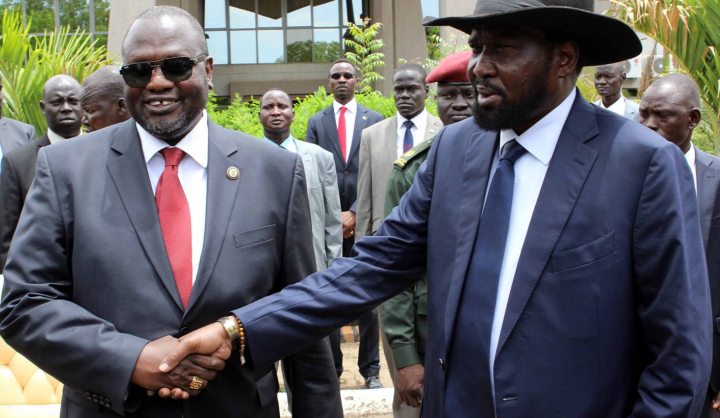Africa
Kiir & Machar: The men that made South Sudan’s predictable famine

Famines are predictable, and they don’t happen by accident. The famine declared in parts of South Sudan this week was the first to be announced anywhere in the world in the last six years. We knew it was coming, and we know who is responsible. By SIMON ALLISON.
As if there wasn’t already enough going wrong in South Sudan, we have this: a formal declaration of famine from the United Nations. The technical definition of famine is complicated, and making the determination is a tricky business, but in essence it is simple enough: in parts of South Sudan, people are already dying of hunger. At least 100,000 are starving, while another million are on the brink.
In South Sudan, this is really saying something. South Sudanese have lived with conflict and drought for generations, and are nothing if not resilient. But this time, even they have run out of survival mechanisms.
“Famine has become a tragic reality in parts of South Sudan and our worst fears have been realised,” said Serge Tissot, the Food and Agriculture Organisation’s representative in South Sudan. “Many families have exhausted every means they have to survive. The people are predominantly farmers and war has disrupted agriculture. They’ve lost their livestock, even their farming tools. For months there has been a total reliance on whatever plants they can find and fish they can catch.”
It should never have got to this point. This is a slow-motion tragedy, anticipated by all who watch the country closely, and has unfolded despite the increasingly desperate warnings of aid groups and some international organisations.
South Sudan is a mostly subsistence economy – in other words, people grow and rear what they eat – so when war forced people from their homes they couldn’t plant their crops. What did get planted suffered from exceptionally low rainfall last year, so even markets were bare. Not that people could buy much, anyway: the country’s main source of stored wealth is cattle, and cattle populations have been decimated by fighting and disease. With no homes, no crops, and no cattle, the outcome was inevitable.
“This famine is man-made,” said Joyce Luma, South Sudan country director for the WFP. “The World Food Programme (WFP) and the entire humanitarian community have been trying with all our might to avoid this catastrophe, mounting a humanitarian response of a scale that quite frankly would have seemed impossible three years ago. But we have also warned that there is only so much that humanitarian assistance can achieve in the absence of meaningful peace and security, both for relief workers and the crisis-affected people they serve.”
Luma’s point bears repeating: this famine is man-made. So which men made it?
There are potential scapegoats in every direction. We can look at the declining budget for global humanitarian work, coupled with the increase in emergencies, which means that humanitarian organisations must cover more ground with fewer resources – a recipe for disaster. We can look at the way United Nations peacekeepers in South Sudan have failed to protect humanitarian workers, making access to critical regions more dangerous and sometimes impossible. We can look at the spineless African-led mediation attempts, which have repeatedly reinforced the status quo instead of prioritising the health of the civilian population. We can look at the regional powers – especially Uganda, Sudan and Ethiopia – who are merrily meddling to their own ends in South Sudan, with no thought as to what their actions might mean for ordinary people.
But most of all, we must look at South Sudan’s own leaders, who have presided over the complete collapse of the world’s newest nation. There are no great ideals at the heart of this conflict; as much as President Salva Kiir and rebel leader Riek Machar may try to characterise it as such, this is not a noble contest of good versus evil. It’s a brutal, ugly fight for power between two men who have repeatedly shown themselves prepared to sacrifice the people they purport to lead on the altar of their own narrow ambition.
The famine in South Sudan was foreseen. It was not a surprise. Both Kiir and Machar, and the generals and warlords they lead, knew what was coming, and changed nothing. They consciously led their people into starvation, casually throwing away lives now and livelihoods in the future – for chronic hunger, even when it doesn’t kill, leaves its indelible mark physically and mentally on the people who suffer from it.
Whatever emergency international response is scrambled now is already too late. A generation has already been scarred. International humanitarian groups are in damage control mode, trying to mitigate both the immediate and long-term consequences of a callous, calculated abnegation of responsibility from South Sudan’s leaders.
The famine in South Sudan is man-made. And these are the men that made it. DM
Photo: South Sudan President Salva Kiir (R) shakes hands with former rebel leader and First Vice-President Riek Machar (L) after a new unity government was sworn-in, Juba, South Sudan, 29 April 2016. EPA/PHILLIP DHIL















 Become an Insider
Become an Insider